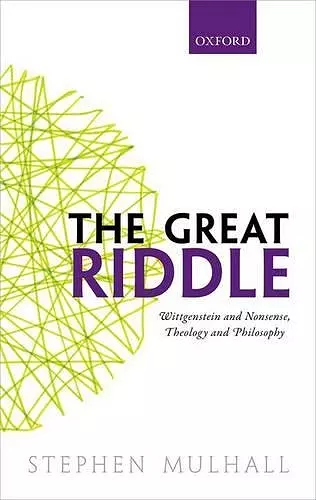The Great Riddle
Wittgenstein and Nonsense, Theology and Philosophy
Format:Hardback
Publisher:Oxford University Press
Published:3rd Dec '15
Currently unavailable, and unfortunately no date known when it will be back
This hardback is available in another edition too:
- Paperback£26.49(9780198801627)

Can we talk meaningfully about God? The theological movement known as Grammatical Thomism affirms that religious language is nonsensical, because the reality of God is beyond our capacity for expression. Stephen Mulhall critically evaluates the claims of this movement (as exemplified in the work of Herbert McCabe and David Burrell) to be a legitimate inheritor of Wittgenstein's philosophical methods as well as Aquinas's theological project. The major obstacle to this claim is that Grammatical Thomism makes the nonsensicality of religious language when applied to God a touchstone of Thomist insight, whereas 'nonsense' is standardly taken to be solely a term of criticism in Wittgenstein's work. Mulhall argues that, if Wittgenstein is read in the terms provided by the work of Cora Diamond and Stanley Cavell, then a place can be found in both his early work and his later writings for a more positive role to be assigned to nonsensical utterances--one which depends on exploiting an analogy between religious language and riddles. And once this alignment between Wittgenstein and Aquinas is established, it also allows us to see various ways in which his later work has a perfectionist dimension--in that it overlaps with the concerns of moral perfectionism, and in that it attributes great philosophical significance to what theology and philosophy have traditionally called 'perfections' and 'transcendentals', particularly concepts such as Being, Truth, and Unity or Oneness. This results in a radical reconception of the role of analogous usage in language, and so in the relation between philosophy and theology.
Stephen Mulhall's recent book derived from his 2014 Stanton Lectures is a well written, carefully argued and sophisticated contribution which centrally rests upon a resolute reading of the early Wittgenstein. His project is to take the resolute reading combined with several other additional ways of reading Wittgenstein, such as Malcolm on analogy, to bring out hitherto unnoticed aspects of his work and offer a properly philosophically grounded articulation of grammatical Thomism. As the chapters progress there are steadily increasing layers of sophisticated Wittgenstein interpretation, such as that involving analogy, which build upon each other to claim that his later work has a perfectionist dimension which relates to the concerns of moral perfectionism and 'perfection' and 'transcendentals'. * Mark Addis, Notre Dame Philosophical Reviews Online *
ISBN: 9780198755326
Dimensions: 222mm x 144mm x 19mm
Weight: 288g
148 pages